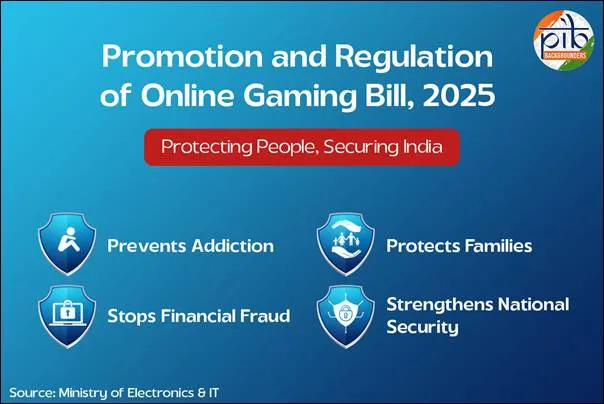India has recently passed the Promotion and Regulation of Online Gaming Act, 2025, a landmark law that has stirred debates across industries, policymakers, and gaming enthusiasts. With the exponential rise in online gaming, fantasy sports, esports, and real-money gaming platforms, this law aims to regulate the sector, protect players, and ensure responsible practices.
The new online gaming law is seen as a turning point in India’s digital economy. It not only provides a legal framework for the growing industry but also ensures consumer safety and fair play. As the Indian gaming market is projected to cross billions in revenue by 2028, understanding the details of this law is crucial for both companies and players.
In this article, we break down 5 key things you should know about India’s new online gaming law, highlighting its most important features, impacts, and implications for the future.
1. Licensing and Regulation under the Online Gaming Law

Key Features:
- Every online gaming company must obtain a license from the central gaming authority.
- Strict compliance rules are laid out for fantasy sports, card games, esports, and real-money games.
- Non-licensed operators will face heavy penalties, including fines and bans.
- The law creates a National Online Gaming Commission to monitor the industry.
The first major element of the law is the introduction of mandatory licensing. For years, online gaming companies operated in a legal grey area, with different states having different policies. This law centralizes regulation, making it easier for companies to operate across the country under a single legal framework.
By requiring companies to obtain licenses, the government ensures accountability, transparency, and adherence to ethical practices. For players, this means safer platforms, fewer frauds, and standardized game fairness. The creation of the National Online Gaming Commission also marks the beginning of centralized monitoring of this fast-growing sector.
2. Player Protection and Responsible Gaming Measures
Key Features:
- Strict age verification to prevent minors from accessing real-money gaming.
- Mandatory self-exclusion features for players prone to addiction.
- Spending limits to prevent excessive financial losses.
- Mandatory display of odds and risks before gameplay.
The law places strong emphasis on protecting players from potential harms of gaming addiction and financial risks. By making age verification mandatory, the Act aims to safeguard minors from engaging in money-based games. Additionally, players can now set spending limits and use self-exclusion tools, ensuring they have control over their gaming habits.
This move aligns India with international standards of responsible gaming. It acknowledges the fact that while online gaming is a form of entertainment, it must be enjoyed responsibly without harming mental health or financial well-being.
3. Taxation and Revenue Framework for Online Gaming

Key Features:
- All licensed platforms must pay a standardized Goods and Services Tax (GST).
- Real-money gaming platforms to pay additional levies based on player winnings.
- Transparent revenue-sharing between states and the central government.
- Tax rebates for startups in the gaming sector to encourage growth.
One of the most debated aspects of the law is taxation. For years, the Indian gaming industry faced confusion due to varying tax interpretations. The new law simplifies this by creating a uniform taxation framework.
While this ensures higher revenue for the government, it also provides clarity to companies and investors. Startups and mid-level gaming companies benefit from tax rebates, which encourages innovation and competition in the sector. At the same time, stricter rules on real-money gaming winnings ensure the government can regulate high-stakes gaming responsibly.
4. Ban on Illegal and Harmful Gaming Activities
Key Features:
- Complete ban on unlicensed offshore gaming platforms.
- Strict penalties for gambling disguised as online skill games.
- Prohibition of games that promote violence, obscenity, or misinformation.
- Law enforcement agencies empowered to block illegal apps and websites.
India’s new online gaming law makes a clear distinction between games of skill and games of chance. While legitimate platforms are encouraged, gambling disguised as online games faces a complete ban. Offshore companies that operate without Indian licenses will also be blocked.
The law further extends to content moderation, ensuring that games promoting harmful or obscene activities are restricted. This step is significant in protecting cultural values and preventing exposure to inappropriate content, especially for younger audiences.
5. Impact on the Indian Online Gaming Industry
Key Features:
- Boost in investor confidence with clear regulations.
- Growth opportunities for Indian gaming startups and developers.
- Increased employment in gaming, animation, and esports sectors.
- Global recognition of India as a regulated gaming market.
The long-term impact of this law is likely to be positive for the Indian economy. With a regulated structure, international investors may now look at India as a safe and profitable gaming market. Domestic startups can innovate without fear of legal uncertainty, and new jobs will be created in technology, design, and esports management.
Additionally, India’s position in the global gaming industry is set to improve, as this law brings it closer to international standards. While some companies may initially face compliance hurdles, the long-term benefits of credibility and growth outweigh the challenges.
Conclusion – 5 Key Things You Should Know About India’s New Online Gaming Law

The Promotion and Regulation of Online Gaming Act, 2025 is a landmark development that changes how the Indian gaming sector operates. It ensures transparency, protects players, and provides the government with a steady revenue stream.
While the law introduces strict regulations, it also creates opportunities for innovation and growth. For players, this means safer platforms and more responsible gaming experiences. For companies, it means credibility and investment opportunities in a booming industry.
Overall, India’s new online gaming law is not just about regulation; it is about shaping the future of a digital economy that is already one of the fastest-growing in the world.
Table: Key Details of India’s New Online Gaming Law
| Aspect | Key Details |
|---|---|
| Law Name | Promotion and Regulation of Online Gaming Act, 2025 |
| Licensing Requirement | Mandatory license from National Online Gaming Commission |
| Player Protection | Age verification, spending limits, self-exclusion tools |
| Taxation Framework | Standard GST, levies on real-money gaming, tax rebates for startups |
| Ban on Illegal Games | Prohibition of offshore, gambling-based, and harmful content games |
| Regulatory Authority | National Online Gaming Commission |
| Impact on Industry | Growth in startups, investor confidence, new job creation |
| International Alignment | Closer to global gaming regulations |
FAQs on India’s New Online Gaming Law
1. What is India’s new online gaming law?
It is the Promotion and Regulation of Online Gaming Act, 2025, which regulates and licenses the gaming industry.
2. Why was the online gaming law introduced?
To ensure player protection, regulate real-money gaming, and bring uniform taxation across the country.
3. Who will regulate the gaming industry under this law?
The National Online Gaming Commission will oversee licensing, compliance, and monitoring.
4. Are minors allowed to play online games under this law?
Minors cannot participate in real-money games due to strict age verification requirements.
5. How does the law affect real-money gaming platforms?
They must obtain licenses, pay taxes, and follow responsible gaming rules.
6. Will offshore gaming platforms be banned?
Yes, unlicensed offshore platforms will be banned and blocked by Indian authorities.
7. Does this law allow gambling?
No, gambling disguised as skill games is prohibited under the law.
8. How will this law help gaming startups?
Startups get tax rebates, a clear legal framework, and better investor confidence.
9. What penalties exist for violating the law?
Non-compliance can lead to heavy fines, platform bans, and legal action.
10. How will players benefit from the law?
Players enjoy safer platforms, transparency in winnings, and responsible gaming tools.









